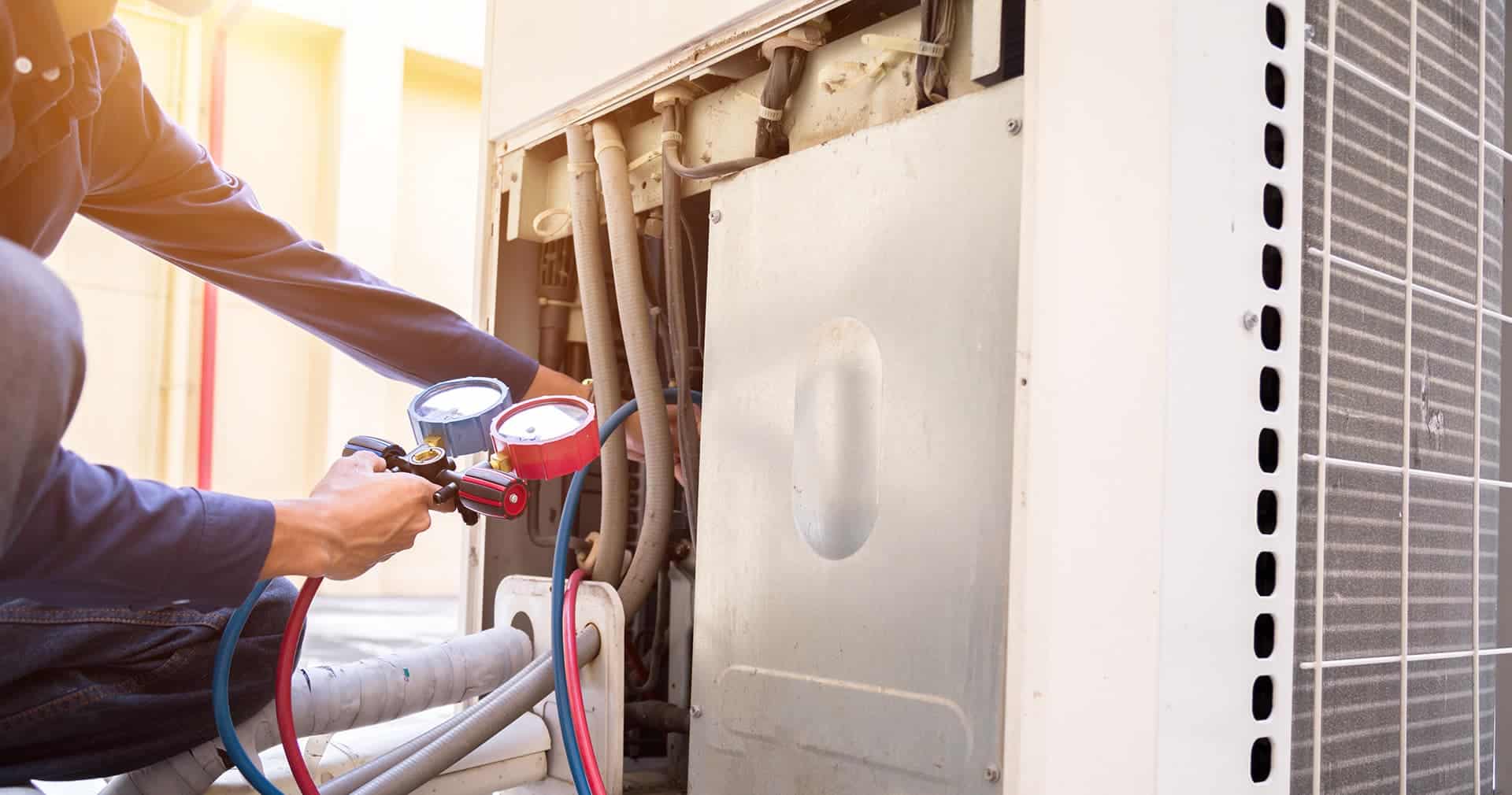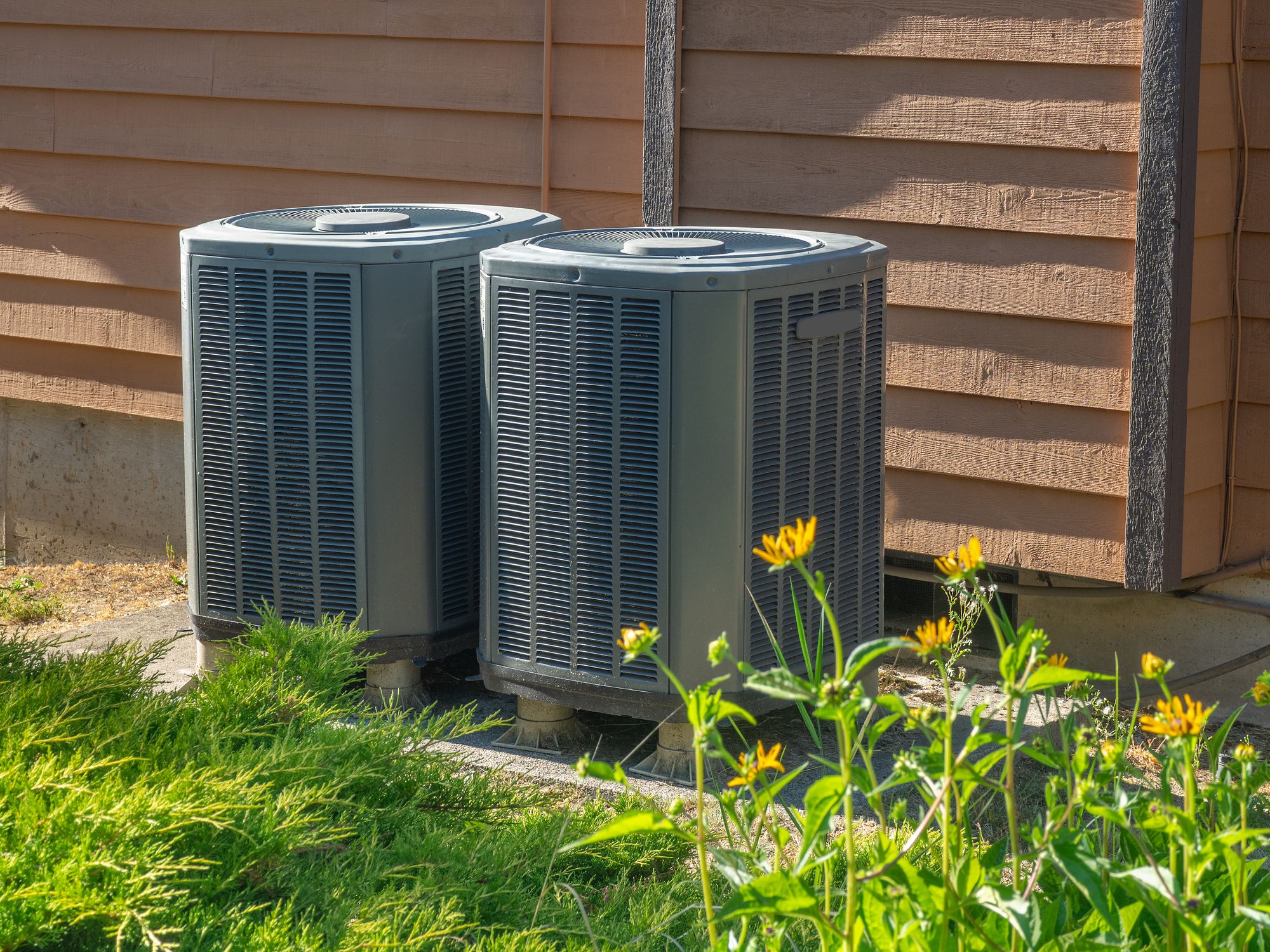See how HVAC experts provide cost-effective comfort solutions for properties
Wiki Article
Exploring the Vital Parts of a Reliable A/c System
An efficient heating and cooling system is developed on several important components that operate in harmony. Each component, from the thermostat to the ductwork, plays a vital role in keeping convenience and power performance. Recognizing these components is important for maximizing performance and improving interior air high quality. As one examines these components, the detailed relationships in between them reveal insights right into enhancing total system effectiveness. What certain elements add most to this effectiveness?The Function of the Thermostat in A/c Efficiency

Although typically overlooked, the thermostat plays a critical duty in the efficiency of heating and cooling systems. HVAC experts. This little gadget acts as the key nerve center, regulating temperature setups and guaranteeing suitable comfort within a room. By precisely picking up the ambient temperature, the thermostat communicates with the air, air flow, and heating conditioning systems to preserve the preferred environment
An effective thermostat lessens energy consumption by activating the HVAC system only when necessary, thereby preventing too much home heating or cooling. Modern wise and programmable thermostats improve this effectiveness better by permitting individuals to establish routines and from another location readjust setups, adapting to daily regimens.
The positioning of the thermostat is crucial; inappropriate place can lead to inaccurate temperature analyses, resulting in ineffective operation. In general, a well-functioning thermostat not only improves comfort but also adds considerably to energy savings and the longevity of the cooling and heating system.
Comprehending the Relevance of Air Filters
Air filters serve a vital feature in a/c systems by assuring that the air circulating within a space continues to be healthy and balanced and clean. These filters trap dirt, allergens, and other pollutants, preventing them from being recirculated throughout the environment. By catching these bits, air filters add to boosted interior air quality, which can greatly benefit occupants' health and wellness, particularly those with allergies or respiratory problems.Additionally, maintaining clean air filters boosts the effectiveness of cooling and heating systems. Blocked filters can restrict air movement, creating the system to work tougher to keep desired temperatures, causing raised power intake and greater utility expenses. Regularly replacing or cleaning up filters is an essential maintenance step that can extend the lifespan of heating and cooling equipment. Inevitably, recognizing the importance of air filters allows property owners and structure managers to take proactive procedures to assure a well-functioning, efficient cooling and heating system that advertises a comfy and safe interior environment.

The Capability of the Heater and Warmth Pump
Heating systems and warm pumps are vital components of cooling and heating systems, in charge of giving warmth throughout cooler months. Furnaces operate by heating air through burning or electrical resistance, after that distributing it throughout the home by means of ducts. They commonly offer rapid home heating and can be fueled by all-natural gas, electrical energy, or oil, depending upon the system kind.Alternatively, heat pumps move warm instead of generate it. They remove warm from the outside air or ground, even in reduced temperature levels, and transfer it indoors. HVAC experts. This dual performance permits warmth pumps to additionally supply cooling in warmer months, making them flexible choices for year-round environment control
Both systems require appropriate maintenance to assure performance and durability. While heating systems master severe cool, heatpump can be beneficial in modest environments. Understanding their distinctive performances aids property owners in choosing one of the most suitable choice for their home heating requires.
Discovering the Cooling System
The air conditioning system is an important element of a/c systems, available in numerous types to suit various requirements. Understanding the efficiency ratings of these devices is vital for making informed options regarding power intake and expense. This area will explore the diverse kinds of air conditioning system and make clear exactly how effectiveness ratings influence performance.Kinds of Air Conditioners
While various aspects influence the choice of a/c systems, comprehending the various kinds offered is crucial for property owners and structure supervisors alike. Central air conditioners are created to cool down entire homes or structures, using a network of ducts for airflow. Window systems supply a more localized service, perfect for single areas or little rooms. Mobile a/c provide versatility, permitting customers to move the system as required. Ductless mini-split systems are one more option, incorporating the effectiveness of main systems with the ease of zoning, as they call for no ductwork. Ultimately, geothermal systems harness the earth's temperature level for energy-efficient air conditioning. Each kind features distinct benefits, making informed choices necessary for reliable climate control.
Effectiveness Ratings Clarified
Understanding performance ratings is crucial for selecting the best air conditioning unit, as these metrics give insight into the system's efficiency and energy usage. The most common score for ac system is the Seasonal Power Performance Proportion (SEER), which determines the cooling output during a regular air conditioning season split by the complete electrical energy input. A greater SEER shows better efficiency. Additionally, the Energy Performance Proportion (EER) is made use of for determining efficiency under details conditions. An additional crucial metric is the Energy Celebrity accreditation, which indicates that a device fulfills strict energy performance guidelines. By assessing these scores, consumers can make enlightened options that not only optimize convenience however also decrease energy prices and environmental impact.The Value of Ductwork and Air movement
Effective ductwork design and air movement administration play crucial functions in the overall efficiency and performance of a/c systems. Proper ductwork warranties that conditioned air is dispersed evenly throughout a room, reducing temperature fluctuations and enhancing convenience. Properly designed ducts lessen resistance to airflow, lowering the workload on HVAC devices and ultimately lowering power intake.Airflow management involves tactically placing vents and registers to enhance the circulation of air. This prevents common concerns such as warm or cold areas, which can take place when air flow is obstructed or improperly well balanced. Additionally, the appropriate duct products and insulation can better enhance performance by minimizing heat loss or gain during air transportation.
An effective ductwork system not just contributes to energy cost savings yet can additionally extend the life expectancy of heating and cooling tools by lowering unneeded pressure (HVAC experts). Consequently, recognizing the relevance of ductwork and air flow is essential for attaining peak a/c system performance
Regular Upkeep Practices to Boost Efficiency
Normal upkeep methods are essential for ensuring peak performance of HVAC systems. These techniques include routine assessments, cleansing, and necessary repairs to keep the system running successfully. Regularly changing air filters is crucial, as stopped up filters can block air flow and decrease efficiency. Additionally, technicians need to examine and tidy evaporator and condenser coils to protect against getting too hot and power waste.Annual specialist assessments are additionally advised, as experienced technicians can recognize possible issues before they escalate. Lubing relocating parts decreases deterioration, adding to a longer life expectancy for the system. Furthermore, making certain that the thermostat functions properly aids in preserving excellent temperature level control.

Regularly Asked Concerns
Just how Often Should I Replace My Thermostat?
Thermostats ought to normally be replaced every 5 to 10 years, relying on usage and technology advancements. Routine checks are suggested to ensure peak performance, specifically if experiencing inconsistent temperature level control or raised power prices.What Dimension Air Filter Is Finest for My Cooling And Heating System?
The very best size air filter for a HVAC system differs by system design. Usually, it's vital to seek advice from the proprietor's handbook or inspect the existing filter dimensions to ensure peak performance and air high quality.Can I Mount a Warm Pump Myself?
Installing a heat pump individually is feasible for experienced individuals, yet it needs expertise of electric systems and regional codes. Hiring a specialist is recommended to guarantee appropriate setup and ideal system performance.Just how Do I Know if My Ductwork Is Effective?
To click here determine ductwork efficiency, one need to check for leakages, step air flow at vents, check insulation quality, and assess temperature differences between supply and return air ducts. Specialist analyses can supply extensive understandings right into overall performance.What Are Signs My HVAC Demands Immediate Maintenance?
Indicators that a heating and cooling system requires prompt upkeep include unusual sounds, irregular temperatures, enhanced energy expenses, unpleasant smells, and frequent cycling. Attending to these concerns promptly can prevent additional damage and warranty height system efficiency.Air filters serve an important feature in Cooling and heating systems by guaranteeing that the air flowing within a room continues to be clean and healthy and balanced. In addition, preserving clean air filters improves the performance of A/c systems. Ductless mini-split systems are one more alternative, incorporating the effectiveness of main systems with the benefit of zoning, as they call for no ductwork. Understanding effectiveness ratings is important for picking the right air conditioning device, as these metrics supply insight into the system's performance and power usage. The finest size air filter for a Heating and cooling system differs by system design.
Report this wiki page